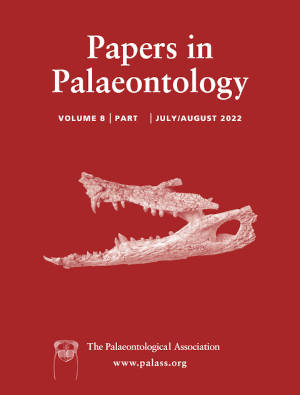Article: A new gecko (Squamata, Gekkota) from the Eocene of Geiseltal (Germany) implies long-term persistence of European Sphaerodactylidae
Publication: Papers in Palaeontology
Volume:
8
Part:
3
Publication Date:
2022
Article number:
e1434
Author(s):
Andrea Villa, Oliver Wings, and Márton Rabi
DOI:
10.1002/spp2.1434
Abstract
Abstract Gekkota (geckos and pygopods) constitute a diverse and early diverging clade of squamates, but their highly fragmentary fossil record allows only limited insights into their evolutionary history. Even long-known classic Palaeogene Lagerstätten, such as the Eocene Messel and Geiseltal, remained uninformative for gecko evolution. Here we describe an articulated near-complete crown-gekkotan skull from the Eocene of Geiseltal. The skull represents one of the most complete and oldest fossil geckos from the Cenozoic and warrants the naming of a new taxon, Geiseleptes delfinoi gen. et sp. nov. Parsimony analysis of an expanded morphological dataset that comprehensively samples fossil geckos recovers at least two lineages in the Palaeogene of Europe: Gekkonidae and Sphaerodactylidae. Further clades may have been present but require further support. The new species, together with several other European extinct taxa, belongs to the extant clade Sphaerodactylidae. Published molecular phylogenies imply a European dispersal from Africa for the clade, and G. delfinoi constrains the timing of this event to no later than the middle Eocene. Within Sphaerodactylidae, several Eocene, Oligocene and Miocene species form the stem-lineage of the extant Mediterranean-endemic Euleptes europaea of which G. delfinoi is the oldest representative. We here define the new clade Euleptinae for this group. Euleptine geckos had an unusually long evolutionary history in Cenozoic Europe and may represent one of the very few vertebrate clades with a persistent presence since the early Palaeogene, indicating extreme adaptability. As the oldest known crown-sphaerodactylid, G. delfinoi represents an important fossil calibration for divergence dating analyses of geckos.
